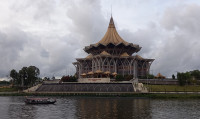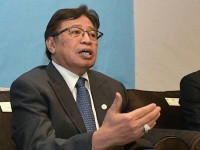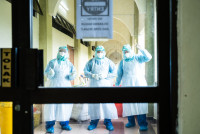SANDAKAN – Earning only about RM10 a day, it is difficult for Aria Abdullah to imagine how large a stack of RM5,000 would look like.
However, she was told that she had to pay about RM5,000 in medical fees in order to be released from the Duchess of Kent Hospital (HDOK) – the only public hospital in Sandakan that provides support for childbirth.
In November last year, the 23-year-old had just given birth two days prior when she was told that she was healthy enough to leave the hospital, but she had to first settle her medical fees before she would be allowed to leave.
Aria, whose parents are migrants hailing from the Philippines, was born in Sandakan, a district on the east coast of Sabah with over half a million population.
But unlike her roommates at the hospital, Aria was the only person without an identification document.
Feeling hopeless, she called her aunt for help.
“My aunt is a smart person. She is always the go-to person when we (Aria and her siblings) are in trouble after both my parents passed away,” she said.
She seemed to have solutions and ideas for all our problems. I am still very young. There are a lot of things that I do not know.”
Her aunt subsequently contacted a person from a non-government organisation here that has been actively helping the migrant community in their village settlement.
The NGO has also set up a school for stateless children in the area.
The NGO representative, Wawan, then sought donations from the public on Facebook, posting a story about Aria needing RM5,000, failing which she would be arrested and have her newborn taken away from her by the Welfare Department.
Wawan, who is a local, met the management staff of the hospital and offered to be the local surety for Aria to be released.
Aria’s hospital debt was settled within a week – all from public donations.
Before she became pregnant, Aria worked at a factory, earning about RM1.20 to RM1.50 per hour.
.png)
Aria’s story is only one of hundreds of other stories in Sandakan involving poor migrants who have given birth in government hospitals but were unable to pay the fees.
Any patient welcome, whether local or non-citizen
According to HDOK director Dr Francis Paul, while such a case is common, it is untrue that irregular migrants would be arrested if they are unable to pay the medical fees.
“It (an arrest in the hospital) had happened many years ago, but we do not allow it to happen anymore.
We do not let enforcement officers take action on our patients – any patient – because it is unethical.
“However, it is part of the standard operating procedure for the hospital to report the presence of an irregular migrant in the hospital to the enforcement agencies.
“We must follow the procedure, and whatever enforcement personnel do after our patients are released, it is beyond our control,” he said.
Paul said that HDOK accepts any patient, whether local or not, and whether they have money or not.
He said that the priority of the hospital is to save lives before anything else.
“The procedure for a non-citizen who is unable to pay the medical fees is that they would need to present a local surety (with MyKad).
“Then they can be discharged and pay the debts in instalments.
“Of course, there are rare cases where the patients do not return and the local surety cannot be reached.
However, for most of them, they end up paying all their debts sooner or later,” he said.
Paul said that home birthing without the presence of hospital personnel is dangerous, especially so during the Covid-19 pandemic.
“I advise all people in Sandakan, local or not, to please give birth in the hospitals where we have the professionals and necessary equipment to assist you in the process.
“Giving birth at home is very risky and I strongly advise against it,” he said.
.jpg)
Between life and money
Aria did not end up in the hospital by choice.
But when the midwife who attended to her during her labour told her that her baby was not coming out and that she had to go to the hospital immediately, she was forced to choose between life and money.
“My midwife insisted that I go to the hospital. She told me that it is too risky for me to wait for another minute, as it had been 24 hours since my water broke.
I knew that I could not afford to pay the hospital fees, and I risked getting arrested by the authorities.
“However, knowing that if I stayed at home, I might lose the life of my firstborn. I agreed with the midwife and we called the ambulance,” Aria said.
Fortunately, Aria gave birth to a healthy baby boy at the hospital safely.
Double the cost
A mother’s sacrifices begin as early as the first stage of pregnancy, when a woman has to endure the pain and hardship that comes with hormonal changes, mood swings, back pain, and at times, more serious complications such as pre-eclampsia and anaemia, among others.
The climax of the pregnancy complications is the labour process, which is what many experienced mothers would refer to as a life-and-death experience.
Malaysian mothers can be rest assured that they can get the medical attention needed to solve almost all complications during pregnancy and the labour process.
Medical access for the process of childbirth is easily available via private or public healthcare facilities nationwide – including those in Sandakan.
However, it costs about double the price for a migrant to deliver in Malaysia.
.png)
In Sandakan, HDOK was the only hospital that provided childbirth service, until Bandar Utama Medical Centre Sandakan – a private clinic – opened in 2019.
In HDOK, the price of childbirth for a Malaysian mother ranges from RM2,000 to RM4,000, while the price for a non-citizen ranges from RM4,000 to RM9,000.
The price of giving birth in Bandar Utama Medical Centre varies from RM4,000 to RM8,000 regardless of nationality.
However, the clinic has stopped accepting outside patients due to stricter practises in light of the pandemic.
Only patients who have conducted monthly reviews at the said clinic can give birth there.
As for monthly check-up fees, a nurse working in a klinik desa ibu dan anak (rural clinic for women and children) said that the clinic charges over RM500 as initial payment for a non-citizen to start a pregnancy booklet – referred to as the pink book – and a monthly check-up fee of over RM100.
This is more costly than the fees charged at private clinics, which is about RM100 per month for both locals and non-citizens to undergo check-ups.
However, a local would only need to pay RM1 for a monthly check-up service in a government clinic.
‘I thought I was going to die’
Dina, 39, who lives in a squatter house near a construction site about 15 minutes from Sandakan town, has six children, with the youngest being a 5-month-old and the eldest a 10-year-old.
She gave birth to all her children with the help of several uncertified midwives.
However, Dina shared her near-death experience during her last labour.
“I thought I was going to die. After my baby was born, the next step was the much harder and scarier process of getting the placenta out of my body.
“After we waited for half an hour and my placenta still did not come out, I started to feel excruciating pain in my belly.
“The midwife then cut bits of my hair, put it in a glass of water, and asked me to drink it.
I started to vomit the water back out, as the midwife told me that vomiting would encourage my body to push my placenta out. But it did not happen,” she shared.
Dina said that she remembered hearing cases of mothers who have died after giving birth because their placenta did not exit their bodies, so she started fearing for her life.
“The midwife said I should go to the hospital, but I told her that I do not want to get caught, and I do not have money to pay for the medical fees.
“She agreed that we wait for another 20 minutes.
“Thankfully, the placenta came out within ten minutes and I survived the labour process,” she said.
.jpg)
Dina said that while she knew that the hospitals would have proper medicine and equipment that would help with getting the placenta out of the body, she is glad that she took the risk and waited longer.
If I had gone to the hospital then, I would have been in the detention centre right now,” she said.
Dina said since she came to Sabah from the Philippines for work some 20 years ago, she is always envious of Malaysian citizens.
“I think Malaysians with the blue MyKad are not aware of how lucky they are to be able to enjoy cheap healthcare, to be able to send their children to school, to be able to walk around freely without fear of getting caught, to be able to have a pregnancy scan and see their baby even before he was born.
“If I was a Malaysian, I think I would be content with my life all the time.” – The Vibes, February 1, 2022
This is the first part of an article series produced under the Investigative Journalism Grant by Internews. The second part will appear tomorrow.
Internews is an international non-profit organisation with 30 offices around the world, including headquarters in California, Washington DC, London and Paris, and regional hubs in Bangkok, Kyiv, and Nairobi.
This publication/story was produced with the financial support of the European Commission. Its contents are the sole responsibility of Internews and do not necessarily reflect the views of the European Commission



.png)

























